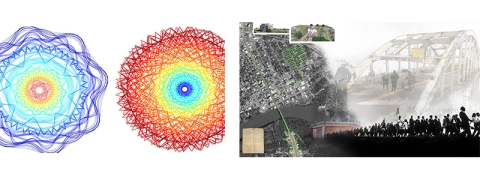
Georgia Tech sent two teams to the 2022 ACCelerate Festival of Creativity and Innovation in Washington, D.C., and is honored to announce that the People’s Choice Award for Advancing Public Knowledge went to the Georgia Tech team, Walking in the Footsteps of History.
The ACCelerate Festival, a celebration of creative exploration and innovative research happening at the intersection of science, engineering, arts, and design, this year featured 12 teams from universities and colleges across the Atlantic Coast Conference (ACC). 31,527 people attended this year’s event, held April 8 – 10, 2022 at the National Museum of American History in Washington, D.C. Votes were cast for all 26 projects, and a remarkable 48% of the votes supported this Georgia Tech project.
Walking in the Footsteps of History
The multidisciplinary team, led by Danielle Willkens, assistant professor at the School of Architecture, included graduate and undergraduate students in Architecture and Urban Design. The team developed a unique approach to understanding the import and impact of what came to be known as Bloody Sunday, when, on March 7, 1965, armed Alabama State Troopers attacked peaceful civil rights activists. To achieve their mission of developing physical context and an experiential timeline, the team created an installation that introduces patrons to the vast landscape of the people and places who were pivotal (and until now, often unknown) in this historical event.
Team member Patricia J. Rangel, a graduate student in Architecture, noted the remarkable connections that emerged when sharing the exhibition in the Smithsonian. “The entire experience, from being selected to the team, to working alongside such talented people, to engaging with people of all ages and backgrounds, was a privilege. The ultimate audience member we had in mind while designing our pieces were the descendants of the foot soldiers and participants of the marches. The highlight of the entire weekend was the visit from Tracey Todd-Coleman and her two boys, Tyson and Todd. The twins are the great-great-great grandsons of David Hall, a Black farmer in Dallas Country, AL who offered his land to the movement as the first campsite of the Selma-Montgomery march. When Tracey, who is not a crier, got emotional when she saw her grandfather's image at the Smithsonian and photographed the monitor to send to her grandmother, Mr. Hall's daughter, there was a sense we may have done something right. Places and people's stories are significant. The Smithsonian and the experience of exhibiting there reinforced that people of all ages are eager to learn and be inspired by others who made sacrifices for future generations.”
Heart Sense: Reflections on Physiology and Embodiment
The second Georgia Tech team that was invited to present at the 2022 ACCelerate Festival was led by Nassim Parvin, associate professor, School of Literature, Media, and Communication (LMC). Participating faculty included Lewis Wheaton, associate professor, Biological Sciences, Georgia Tech, and Anne Pollock, previously associate professor, LMC, Georgia Tech, now at King’s College London. Student researchers included a postdoctoral fellow at LMC along with Digital Media graduate students.
Upon the team’s return from D.C., Parvin reflected on how the experience had moved the project forward. She noted that the current installations reflect how our bodies are in and of the environment. After the team’s interactions with patrons at the ACCelerate Festival, they began to consider how to expand and extend the project. She said, “In our future installations we would like to explore creative ways that we might collectively shape the environment through reflection upon and reorientation of our bodies. For example, what if you could enter a dance floor and be able to change the light and music together with other dancers by changing the intensity of your movements and your breath? What can we learn from feeling our heartbeats alongside others?”
These were just some of the questions that arose from the team’s observations of, and conversations with, the students, teachers, school administrators, and general public who enjoyed the installation. The experience led Parvin to also consider the educational potentials of the project, and ways that it can be made accessible to educators, researchers, and artists.
The ACCelerate Festival of Creativity and Innovation is programmed by Virginia Tech’s Institute for Creativity, Arts, and Technology and the Smithsonian Institution’s Lemelson Center for the Study of Invention and Innovation.